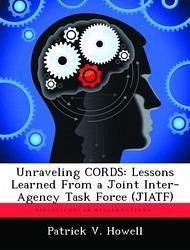Though the United States military has excelled in winning wars, it has not enjoyed the same success at "winning the peace". That requires a coordinated effort from several Departments and agencies of the United States government-- an Inter-Agency operation. And the US'; Inter-Agency efforts since the end of the Cold War have not been extremely successful. However, conducting Inter-Agency operations is not new to the US government. During the Vietnam War, the US established the Civil Operations and Revolutionary Development Support (CORDS) - a Joint Inter-Agency Task Force (JIATF) comprising numerous Departments and agencies. CORDS was a unique civil-military organization that combined all military and civilian pacification efforts, resources and personnel into a single chain of command-- a Whole of Government (WoG) approach. This organizational approach differs from current US government and military doctrine for inter-agency operations. In fact, a large body of research consistently cites CORDS as an example to be emulated for inter-agency operations. This raises three questions: 1) Was CORDS an effective JIATF for pacification?; 2) Was that success due to its WoG organizational approach?; and 3) How was CORDS created? The monograph answers the first two research questions together by looking at pacification efforts in Vietnam across three distinct time periods. Then it will answer the last research question by comparing the bureaucratic politicking behind the creation of CORDS to other established patterns of bureaucratic policy-making. The results of this monograph suggest that the US'; current doctrine for Inter-Agency Operations is inefficient and ineffective. Given the likely requirement for increasing Inter-Agency operations makes this a very relevant topic for research.
Hinweis: Dieser Artikel kann nur an eine deutsche Lieferadresse ausgeliefert werden.
Hinweis: Dieser Artikel kann nur an eine deutsche Lieferadresse ausgeliefert werden.








